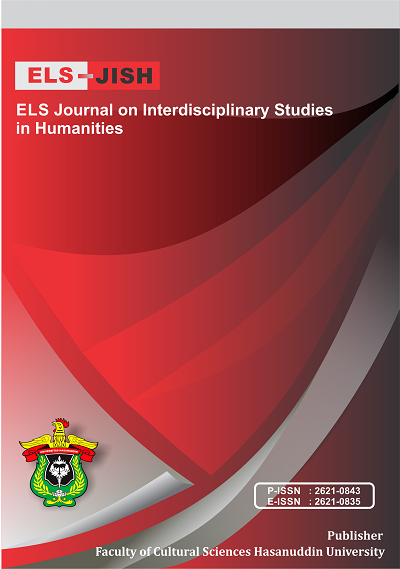Nigerian Poetry: A Systemic Functional Approach
DOI:
https://doi.org/10.34050/elsjish.v7i1.32583Keywords:
Aesthetic, Function, Language, Nigeria, Poetry, StyleAbstract
Within the vast landscape of Nigerian literature, evolving into three principal literary genres, the critical study of poetry has been somewhat neglected, especially when contrasted with the substantial analysis devoted to drama and novels. This is partially attributed to the language used in poetry, its nature which is steep in semantic indirection and its method of pedagogy which often problematizes its appreciation. This study contributes to the study of poetry by exploring Nigerian poetry within the tenets of M.A.K. Halliday's Systemic Functional Linguistic, and qualitative and descriptive design. The analysis focuses on a selected corpus of written Nigerian poetry in the English language, by Wole Soyinka, Christopher Okigbo, Tanure Ojaide, Odia Ofeimun, Psalms Chinaka, and Obari Gomba, which spans the oeuvres of three distinct generations and serve as exemplars of their respective generations. The study provides valuable insights into the significance of language, the evolution of Nigerian poetry, and its styles and functions. It is supported by tangible examples that showcase various elements, such as cohesion, deviation, and code-mixing. It offers a crucial understanding that the use of English in Nigerian poetry is not just a colonial legacy. It is a choice shaped by postcolonial reality. Its deployment is not incidental but a deliberate act of appropriation, protest, and a call for change. This is by the amplification of the voices of marginalized groups within Nigerian society such that language as a socio-semiotic system is deployed to tackle multifaceted issues that plague Nigerian society. The study submits that there is a nuanced tapestry of ideological and stylistic dialogue that connects and differentiates the first, second, and third generations of Nigerian poets. This intergenerational dialogue highlights a continuum of thematic and aesthetic concerns, with notable shifts reflecting the evolving socio-political landscape of Nigeria.
References
Andini, C., Sosrohadi, S., Fairuz, F., Dalyan, M., Rahman, F. F., & Hasnia, H. (2022). The study of Japanese women in the facial treatment advertisement: a semiotics perspective of Pierce’s Theory. ELS Journal on Interdisciplinary Studies in Humanities, 5(2), 337-347.
Aswad, M., Rahman, F., Said, I. M., Hamuddin, B., & Nurchalis, N. F. (2019). A software to increase English learning outcomes: An acceleration model of English as the second language. The Asian EFL Journal, 26(6.2), 157.
Chinaka, P. (2017). Apocalyptic Gong. Kraft Books Limited.
Chinweizu, Jemie, O., & Madubuike, I. (1980). Towards the Decolonization of African Literature. Fourth Dimension Press.
Echetebih, B. S. (1988). Selected African and Non-African Poetry for 1988, 1989 and 1990 SSCE in Literature. Tabansi Publishers.
Egudu, R. (2004). Four Modern West African Poets. NOK Publishers Ltd.
Nwakanma, O. (2010). Christopher Okigbo, 1930-67: thirsting for sunlight. Boydell & Brewer Ltd.
Biodun, J. (2004). Wole Soyinka: Politics, Poetrics and Postcolonialism. Cambridge University Press.
Maduakor, O. (1987). Wole Soyinka, an Introduction to his Writing. Heinemann Educational Books Nigerian PLC.
Nwoga, D. I. (2000). West African Verse. Meshico Enterprise Limited.
Ofeimun, O. (2010). Go tell the generals. Hornbill House of the Arts.
Okigbo, C. (2008). Labyrinths & Path of Thunder. Africa World Press, Inc.
Okunoye, O. (2011). Writing resistance: Dissidence and visions of healing in Nigerian poetry of the military era. Tydskrif vir letterkunde, 48(1), 64-85.
Ojaide, T. (1998). Delta blues and home songs. Ibadan: Kraft Books.
Okuyade, O. (2008). Of the versification of pain: Nigerian civil war poetry. African Literature Today, 26, 128-136.
Rahman, F. (2016). The Strategy of Teaching Literature through Language-based Methods: A Communicative Approach. In Annual Seminar on English Language Studies (Vol. 1, pp. 156-170).
Soyinka, W. (1967). Idanre and Other Poems. Methuen & Co Ltd.
Sukmawaty, Rahman, F. F., & Andini, C. (2022). Covid-19 Pandemic and Axiology of Communication: A Study of Linguistic Phenomena. IJISRT, 7(4), 1079-1087.
Uzoechi, N. (2010). Poetics of Resistance: Ecocritical Reading of Ojaide’s Delta Blues & Home Songs and Daydream of Ants and Other Poems. African Study Monograph.
Yaumi, M. T. A. H., Rahman, F., & Sahib, H. (2023). Exploring WhatsApp as Teaching and Learning Activities during Covid-19/New Normal era: A Semiotic Technology Analysis. International Journal of Current Science Research and Review, 6(12), 7627-7634.
Yaumi, M. T. A. H., Rahman, F., & Sahib, H. (2024). Bridging Language and Technology through Semiotic Technology. International Journal of Social Science Research and Review, 7(1), 52-61.
Zakaria, Duli, A., Rahman, F., & Armin, M. A. (2021). The Myths Of Symbol Of Singgi’tedong Speech In Ma’pandan Ritual In Mamasa Regency. Nveo-Natural Volatiles & Essential Oils Journal| Nveo, 2778-2786.
Downloads
Published
Issue
Section
License
Copyright (c) 2024 Okwudiri Anasiudu

This work is licensed under a Creative Commons Attribution-ShareAlike 4.0 International License.






